The long-awaited National Security Strategy of the German Government is here. On Wednesday, the traffic light coalition ministers presented it – in German, English and French. Japanese and Polish versions are said to follow soon. And what about a version in Chinese? There will be one. One day.
Overall, the direct references to China are extremely limited – even though the People’s Republic has long been seen by German authorities as a significant security risk. But a separate China strategy is said to be coming “soon”, as emphasized by Chancellor Olaf Scholz during the presentation. Or is the federal government just trying not to spoil the mood? After all, German-Chinese government consultations will take place in Berlin next week. And they wouldn’t want to upset the most important trading partner shortly before that.
Today, Xi Jinping celebrates his 70th birthday. From a traditional Chinese perspective, this is not a reason to celebrate. In Chinese, the word for 70 includes the word for decade (shi). And with a southern Chinese accent, it sounds similar to the word for death (si). Therefore, in old age, it is preferable to celebrate the year that includes the number 9 because 9 (jiu) sounds the same as “eternal” in Chinese.
Michael Radunski analyzes why even with regard to Xi, this is not a reason to celebrate. Because eternal refers to Xi’s party leadership and presidency. And these are not good prospects for China and the rest of the world.
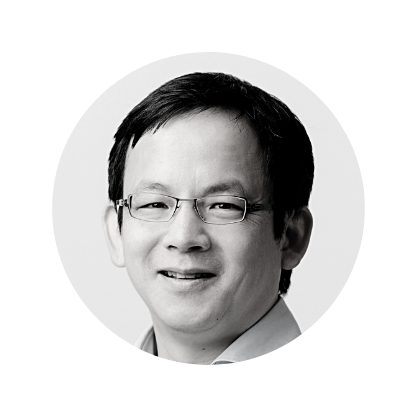
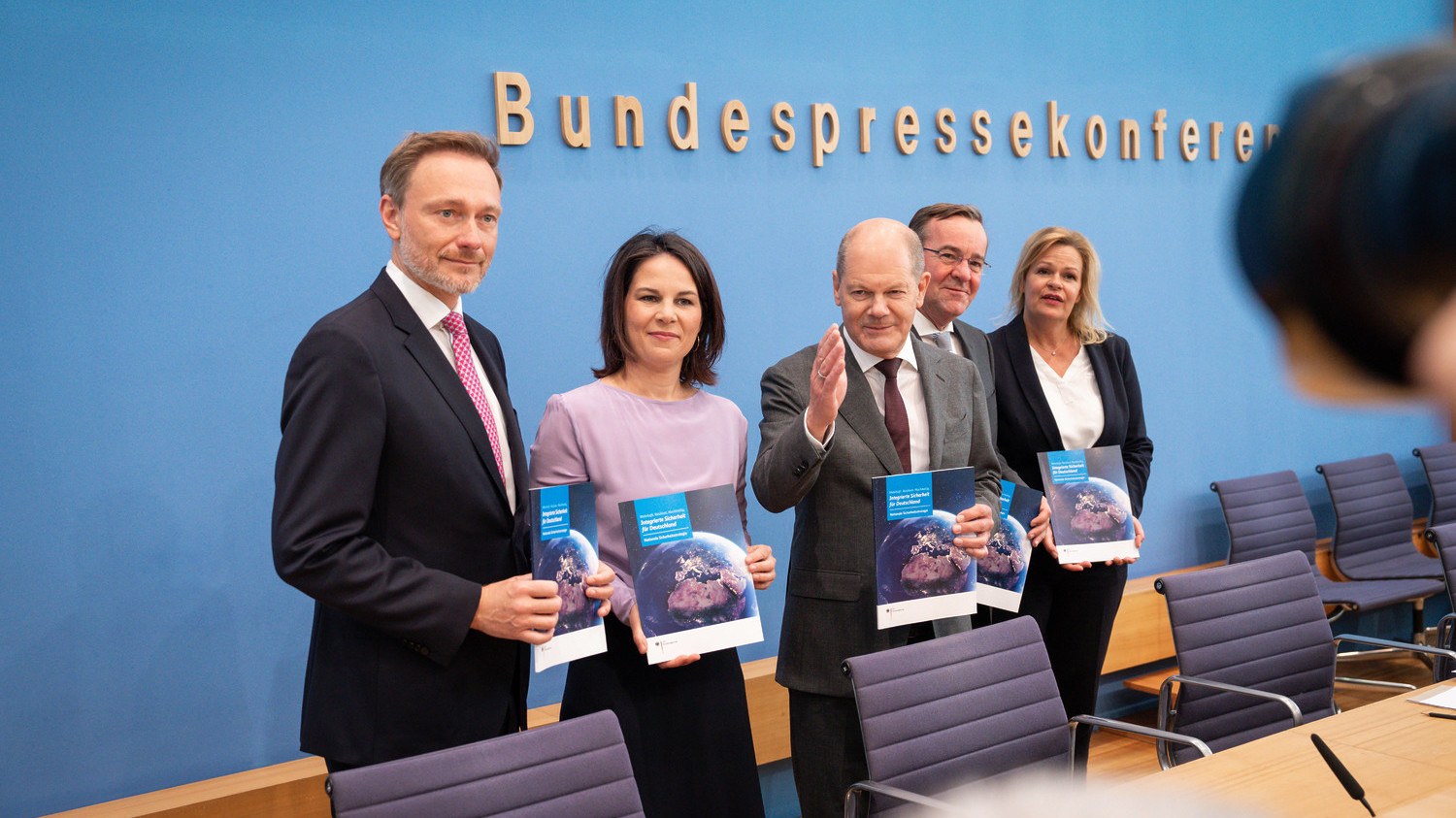
Unsurprisingly, the new strategy identifies “today’s Russia” as the “greatest threat to peace and security in the Euro-Atlantic area for the foreseeable future. In the long term, however, the relationship with China appears to be more significant, especially in view of the commitment to a multipolar world.
At the joint press conference, Finance Minister Christian Lindner (FDP) tried to sum up the attitude toward the People’s Republic: “The US is a value partner, China is a trade partner, but a value rival.” The paper has 74 pages. On China, however, the strategy remains vague and contradictory, as is currently customary. It emphasizes dangers, weighted equally with indispensable partnership.
To this end, the government retreats to the formula of China as a “partner, competitor and systemic rival,” which is currently perceived as politically safe. “We see that the elements of rivalry and competition have increased in recent years, but at the same time China remains a partner without whom many of the most pressing global challenges cannot be resolved,” the overview says.
Further on, on page 23, this approach is elaborated. The national strategy on China formulates the following warnings:
So far, so right. Anyone hoping for an answer to the question of how to respond to the tricky challenge of China will be disappointed by the paper. The German government may be saving this for its China strategy, which could be published at the beginning of July, according to reports.
The argument that a more specific China strategy should be derived from the more general overall strategy only works to a limited extent in this document. The dilemma of a dominant trading partner that is becoming increasingly alienated from Germany in terms of its willingness to engage in dialogue and its practiced values is discussed here, above all with regard to Russia.
The tough decisions on China have thus been postponed again. Chancellor Olaf Scholz expressly emphasized that he was aiming for a “balance”. German-Chinese government consultations will be held in Berlin next week.
Numerous paragraphs of the paper, however, refer to issues where China is the biggest headache for German policymakers. “In general, we must end or at least reduce unilateral dependencies in critical areas, especially through diversification,” it says. Commodity projects are to be targeted together with the business community. For example, there should be government incentives for companies to build up reserves of critical raw materials to compensate for supply disruptions.
In general, international economic and financial relations are to be checked for unilateral dependencies because this has a security policy dimension. But these generalized passages do not answer the question of how the economy should diversify away from the largest market, largest production location and largest supplier without replacement.
The subject of large parts of the paper is the material equipment of the security organs and their European coordination. The approach of “integrated security,” which underlies the National Security Strategy, is intended to go beyond the previous focus on armed forces and diplomacy but also to look at internal security, cyber threats, the effects of economic policy and climate change.
“Bringing all strands of policy” together, however, must succeed without additional funding for the time being, in the view of the traffic light coalition: “In view of the considerable current demands on our public budgets, we are striving to manage the tasks of this strategy without placing an additional burden on the federal budget as a whole.” Lindner rejects the target of two percent of economic output for the defense budget as “not feasible”.
The guidelines of the new strategy under the slogans “Robust. Resilient. Sustainable.” essentially summarize the government’s previous efforts but hardly provide for any fundamentally new approaches. There is no provision for a national security council, as was repeatedly called for in the debate on this strategy, including by the coalition.
Both Foreign Minister Annalena Baerbock (The Greens) and Scholz stressed that the German government’s work in response to Russia’s war of aggression against Ukraine showed that the government apparatus was capable of acting and that no new body needed to be established. Finn Mayer-Kuckuk/Thomas Wiegold
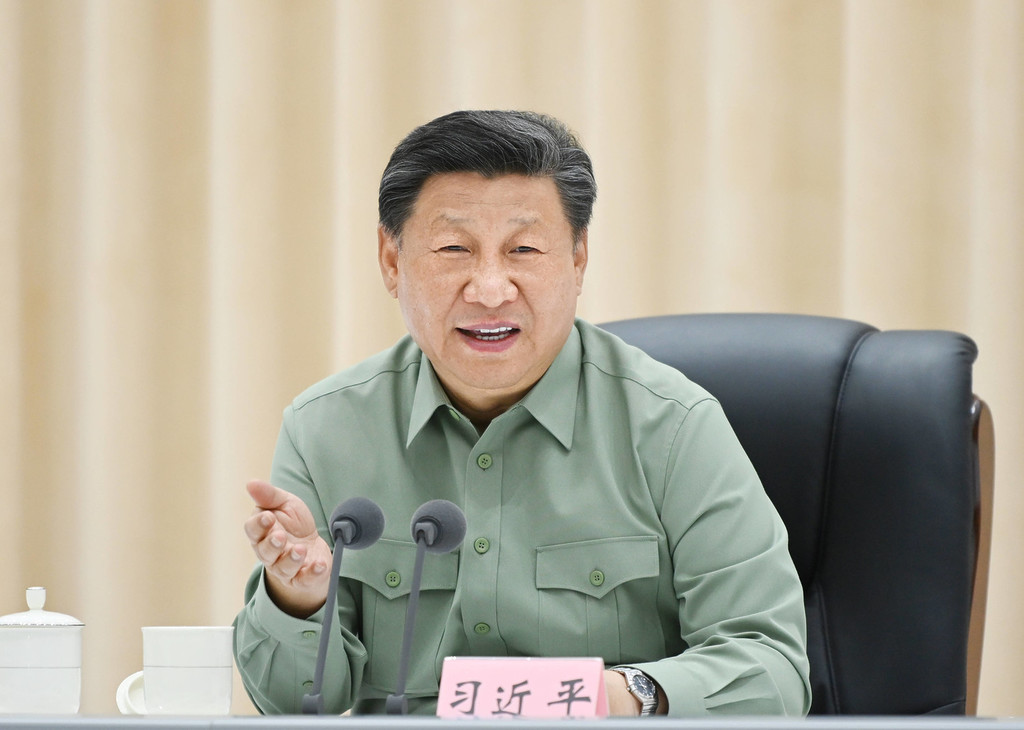
There is currently a debate in China about raising the retirement age. Jin Weigang, president of the Chinese Academy of Labor and Social Security Sciences, recently announced: “People approaching retirement age will have to delay retirement by a few months.” Currently, men in China retire at age 60 and women at age 55. China’s President Xi Jinping (习近平) turns 70 this Thursday. So it would be high time for him to retire.
But as if Jin Weigang had the same thought, he added in an interview with the Global Times newspaper: “The most important feature of the reform is that people can decide for themselves when they want to retire, depending on their circumstances and conditions.” Xi Jinping’s decision is clear. To that end, he has even had the 1982 Chinese constitution’s term limit, and thus the age limit for the office of president, lifted.
Xi Jinping began his third term as president of China this year. And it doesn’t have to stop there. Theoretically, he can rule for life. A circumstance that politicians and legal experts actually wanted to prevent in the 1982 constitution.
With Mao’s reign in mind, they feared that a lifetime in office would again lead to arbitrariness and tyranny, especially in a one-party state. “If someone stays in office for 15 years, the people won’t dare express their opinions to him,” said Fang Yi, one of the drafters of that constitution.
And not only the people. In the current Politburo, at the latest, Xi is surrounded only by loyal cadres. Since then, even in the closest leadership circle, Xi has only been told what he wants to say, critics fear.
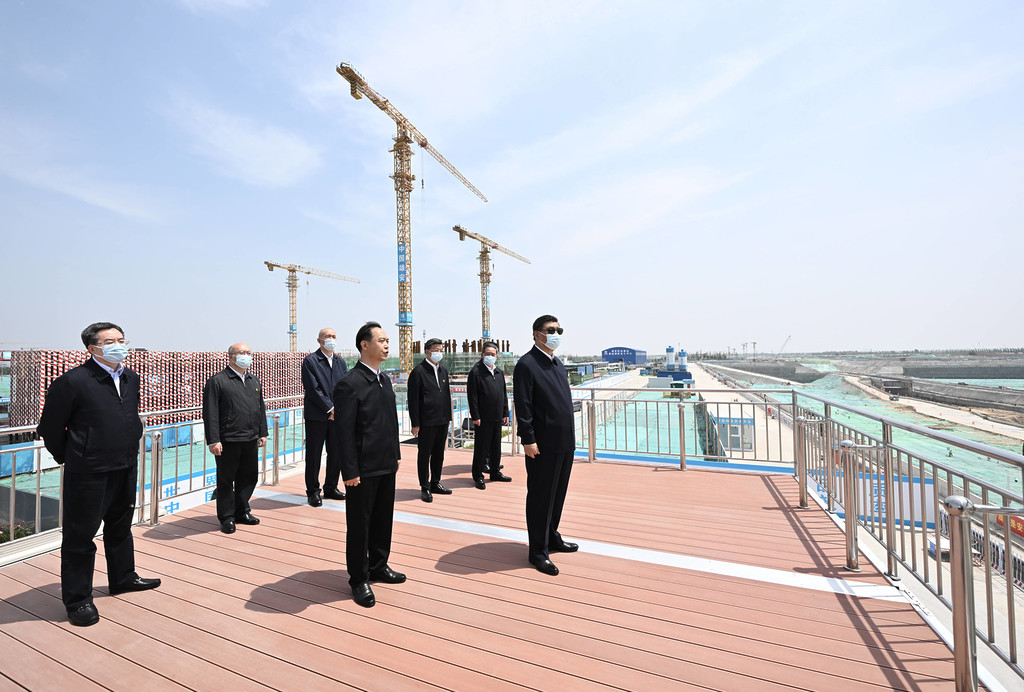
As evidence of how far Xi was disconnected from reality, some cite China’s strict zero-Covid policy. With all his might, Xi had rejected foreign mRNA vaccines, preferring to send millions of people into months-long lockdowns. Only when discontent broke out on the streets of several metropolises did Xi relent and have all restrictions lifted.
The problem is obvious: The more power a person has, the more error-prone the system becomes. And the more difficult it is to correct mistakes. Xi is still succeeding. But the next question immediately arises.
Only he himself knows for sure. A glance at his great rival in Washington makes him seem almost youthful: US President Joe Biden is 80 years old, while his predecessor and possible challenger Donald Trump is 76. Nevertheless, it is unlikely that Xi will make his retirement dependent on the age of his counterparts.
Rather, it would be up to Xi himself to build a successor. Deng Xiaoping once installed Jiang Zemin. He, in turn, handed over the leadership to Wen Jiabao and Hu Jintao in an orderly fashion. Even when bitter trench warfare arose again in the CP, it was possible to agree on a candidate in due time after two terms in office: Xi Jinping was considered at the time to be a compromise who would not hurt anyone. Things turned out differently. And Xi himself has not yet chosen a successor. Last October, he was confirmed as general secretary of the Communist Party for another five years at the party congress. Why is Xi doing this?
One theory is that Xi simply doesn’t trust anyone else to do the job. His mission manifests itself in the ideas of the “Chinese Dream” (中国梦) and the “rejuvenation of the Chinese nation” (中华民族伟大复兴). Xi sees both of these in jeopardy. China is currently facing huge problems: weak economic growth, real estate bubble, indebted provinces. In addition, youth unemployment is at record levels. China’s society is also shrinking and getting older.
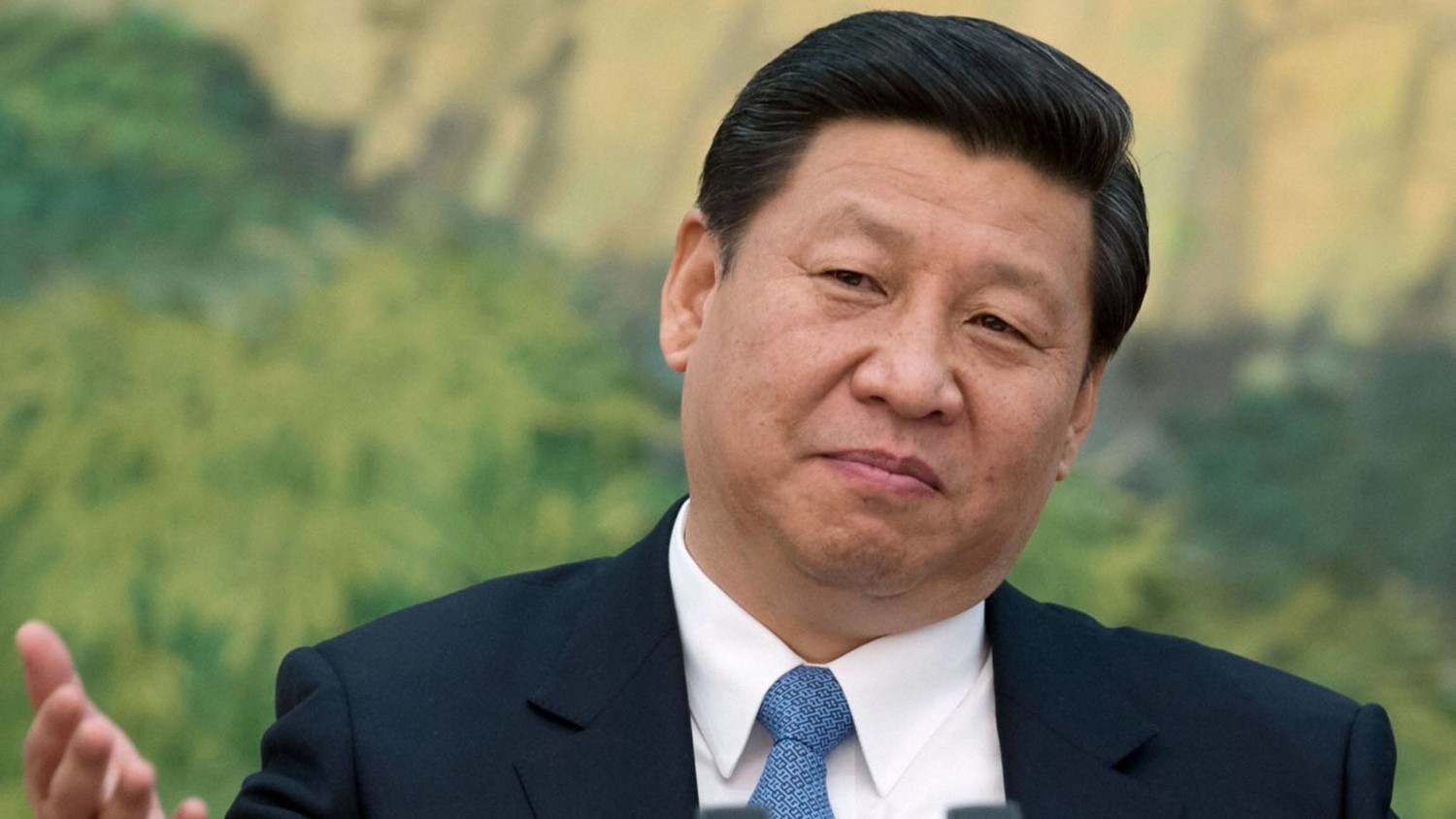
In terms of foreign policy, the situation is hardly any better: The competition with the US is getting tougher and tougher, in Europe China’s annoyance is spreading, and neighboring countries are increasingly concerned about China’s strength. And the list could be continued with topics such as power shortages, Xinjiang, Hong Kong, Taiwan, Ukraine, Russia and the Belt and Road Initiative.
In such a situation, it would be irresponsible from Xi’s point of view to send the CP into a delicate transition process. So he has to do it himself, as China’s COE – Chairman Of Everything. Xi not only heads the party, the state and the military but also leads countless other leadership groups: on reform policy, the economy and finance, Hong Kong and Macao, national security, the modernization of the military or cyber security. In short, Xi is “chairman of everything”.
Another theory is that Xi cannot resign because, otherwise, he would have to fear for his own fate. After all, to become so powerful in the first place, Xi had to eliminate countless rivals along the way. Former Vice Minister of Public Security Sun Lijun, ex-security czar Zhou Yongkang and Bo Xilai are only the most famous names on a long list.
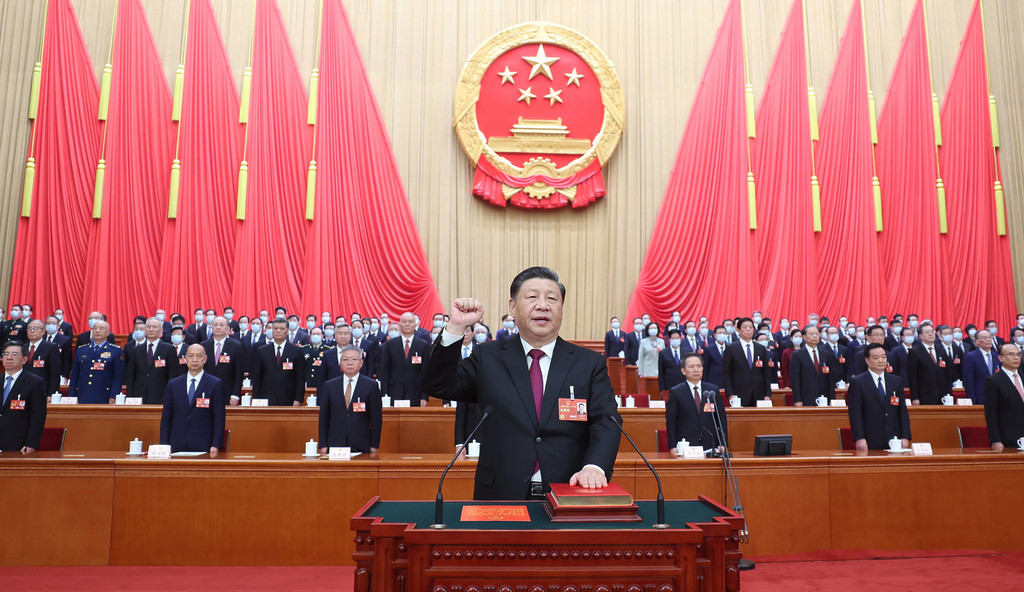
Especially under the pretext of “fighting corruption” many were literally put through the wringer. The “tigers” as well as the “flies”, the large as well as the rather small cadres. In just four years, more than 1.3 million officials and civil servants fell into the clutches of the all-powerful Central Disciplinary Commission. Many of them, their families and their networks are now waiting for their chance to take revenge.
Xi had to experience in his own family how quickly fate can turn: His father, Xi Zhongxun (习仲勋), was a revolutionary of the first hour and deputy prime minister of China – until Mao suddenly dropped his close confidant in 1962.
One way out for Xi would be to build a strong successor. But even if Xi were to find someone he trusted to lead China, it would be an extremely difficult balancing act: Xi‘s successor would have to be strong enough to protect Xi from his opponents even in retirement. On the other hand, he should not be too strong either because few retired leaders have managed to accustom their egos to a life in the second row.
Even the often-praised Deng Xiaoping, who had the orderly two-term transition introduced, continued to pull the strings in the background as the “outstanding leader” until his death. Time and again, he interfered in current politics-whenever he thought his political legacy was in danger. In the case of Xi Jinping, that would probably be: always.
After US Secretary of State Antony Blinken canceled his trip to Beijing in early February due to accusations of espionage against China, he plans to make up for it at the end of this week. Blinken is expected to be in Beijing on June 18 to meet with high-ranking representatives of the Chinese government, according to the US State Department. The aim, it said, is to maintain open channels of communication between the two countries in order to manage relations responsibly.
Following the launch of an alleged Chinese spy balloon over US territory and the ensuing diplomatic rifts in early February, Blinken did meet with China’s top foreign policy official, Wang Yi, on the sidelines of the Munich Security Conference. However, the meeting caused further tensions. Blinken always stressed that he wanted to travel to China as soon as the circumstances were right. However, the leadership in Beijing reacted dismissively to offers of talks from Washington.
In May, after a prolonged radio silence, another meeting of high-level representatives of the two governments took place: Biden’s National Security Advisor, Jake Sullivan, met Wang Yi in Vienna. Afterwards, the US side said that it was ready to put the recent espionage affair behind it. Finally, in early June, a senior official from the US State Department traveled to China. This was interpreted as preparation for an imminent visit by Blinken.
Shortly before Blinken’s trip announcement, however, new allegations of spying attempts by China against the US emerged. Blinken said a few days ago that China has been using the island of Cuba, which is close to the US, to gather intelligence for some time. flee
During Palestinian President Mahmoud Abbas’ visit to Beijing, China took a clear position on the Middle East issue. “The fundamental solution to the Palestinian issue lies in the establishment of an independent Palestinian state based on the 1967 borders with East Jerusalem as its capital,” Xi said, according to Chinese state media.
Back in December, Xi had promised Abbas at a meeting in Saudi Arabia that he would act as a mediator in the Middle East issue. According to Chinese media reports, Xi announced support for admitting the Palestinian Authority as a full member of the United Nations. The United States opposes full Palestinian membership in the UN unless a peace agreement is reached with Israel.
Xi and Abbas announced a strategic partnership during the Beijing visit and signed a number of bilateral cooperation documents, including a pact on economic and technological cooperation, an agreement on reciprocal visa waiver for diplomatic passports, and a friendship between the Chinese city of Wuhan and Ramallah, the seat of the Palestinian government in the West Bank. jul/rtr
Taiwan’s Foreign Minister Joseph Wu has asked for European support in Prague to ensure peace and stability in the Taiwan Strait. “In order for Taiwan to stay strong and resilient and to have the courage to continue the policy of maintaining the status quo, we do need support from European friends,” Wu said in a speech at a conference in the Czech capital.
Czech President Petr Pavel was also present at the event. Pavel was thus the first EU head of state to be officially in the same room with a representative of Taiwan at an event. The Czech Republic does not maintain diplomatic relations with Taiwan. In his speech, Pavel stressed the need to protect democratic governance in Taiwan in the face of increasing pressure from China. However, a face-to-face meeting between Pavel and Wu did not take place.
Foreign Minister Wu was in Prague to meet Milos Vystrcil, president of the Czech Senate. Vystrcil had tried to promote the EU state’s relations with Taiwan in recent years. Wu will also travel to Brussels to meet EU officials. The Czech Republic has changed its approach toward China and Taiwan since the center-right government took office in 2021. Pavel, who took office in March, was the first EU head of state to make phone calls to Taiwan’s President Tsai Ing-wen after his election – rather than to Beijing first. Pavel nevertheless rueled out a trip to Taipei for the time being.
Wang Lutong, China’s director general for European affairs, had criticized Wu’s trip in advance. The Taiwan issue is “core of the core interests of China,” Wang wrote on Twitter. “We urge the European side not to provide stages for separatist activities for ‘Taiwan independence’.” ari
Five China- and Hong Kong-based companies have been removed from the list of potential targets in negotiations on the planned EU sanctions package, according to a media report. Three companies were to remain listed, South China Morning Post reported Wednesday, citing EU circles. Talks with Chinese diplomats had taken place beforehand, it said. The draft sanctions list is part of a broader Russia sanctions package. The companies are to face punitive measures for forwarding banned European goods to the Russian military.
Names circulating in connection with the possible sanctions since early May include 3HC Semiconductors, King-Pai Technology and Sinno Electronics. The narrowing of the list was not yet finally set in stone, according to the report. Negotiations on the eleventh sanctions package are in full swing. Hungary is said to have recently eased its blockade against concessions on the originally planned listing of Chinese companies. EU ambassadors were closer to an agreement on Wednesday. The positions were in “98 percent” agreement, a diplomat said.
With regard to the mechanism for sanctions against third countries that serve as a hub for circumvention deals towards Russia, the EU Commission has largely been able to dispel concerns. Diplomats said the Commission had specified which goods and technologies could be specifically targeted. EU ambassadors plan to make a new attempt to reach an agreement on Monday. After that, the 11th sanctions package would have to be formally signed off by governments in a written procedure. sti/ari
Janka Oertel, Asia expert at the think tank ECFR, wants to run for the European Parliament for the Green Party, as the scientist announced yesterday on Twitter.
Oertel is a distinguished sinologist and China expert with extensive international experience. She was a senior fellow in the Asia program of the German Marshall Fund of the United States (GMF) in Berlin, where she worked on transatlantic China policy as well as emerging technologies and security in East Asia. Oertel completed her doctorate at the University of Jena on Chinese policy within the United Nations, including work at UN headquarters in New York.
She has support from the party leadership: Green Party leader Omid Nouripour also welcomed the announcement for the European elections on Twitter: “It’s good news that Janka wants to go to Europe for us. She would be an enrichment for the Green Group in the European Parliament. Especially in these times, we need a proven China expert as a strong European voice.” mgr/flee
Despite extremely strict US supply chain regulations on products from Xinjiang, Chinese online shopping retailer Temu is selling fashion products from Xinjiang to American consumers. This is reported by Bloomberg with reference to research findings by Tel Aviv-based Ultra Information Solutions, which reviews global supply chains.
Since 2021, the Uyghur Forced Labor Prevention Act (UFLPA) has prohibited cotton import from Xinjiang. Last year, the law was extended to all products from Xinjiang. Among the ten Temu products from Xinjiang discovered by Ultra Information Solutions are sunglasses and sandals. Their origin was not indicated on the sales page. It cannot be proven that any of the products were made under forced labor. “However, their proximity means there is a likely risk, not just a theoretical risk,” says Ben Tzion, CEO of Ultra Information Solutions.
Shipments from China that are sold directly to consumers can avoid the import ban from the UFLPA because they are under an 800 dollars value threshold, above which only a reporting requirement to US Customs and Border Protection is triggered.
Temu belongs to PDD Holdings Inc., which also operates China’s e-commerce portal Pinduoduo. As a shopping portal for clothing and decorative items at extremely low prices, it is a competitor of Shein and aims to wrest market share from Amazon and eBay in the USA. During investigations last year, Bloomberg also discovered garments at Shein whose cotton originates from Xinjiang. jul
China is expected to experience the largest exodus of millionaires worldwide this year, according to a study by Henley & Partners. The study predicts that approximately 13,500 individuals with a net worth of over $1 million will leave the People’s Republic of China. India ranks second among countries from which the wealthy are emigrating, with 6,500 individuals, followed by the United Kingdom with 3,200.
One of the main reasons cited is Xi Jinping’s concept of “Common Prosperity”. As a political guideline, it has made the business climate difficult for many entrepreneurs in recent years, partly due to harsh crackdowns in various industries. Wealthy entrepreneurs are increasingly drawn to foreign countries, such as Singapore, which is culturally and geographically close. Additionally, Covid restrictions have contributed to many wealthy Chinese individuals immigrating to the city-state. jul
Renowned artist and designer Huang Yongyu has died. His family announced that he passed away on Wednesday afternoon. He was 99 years old. Huang is best known in China for designing stamps featuring the twelve Chinese zodiac animals. In January, he created stamps for the Year of the Rabbit (2023).
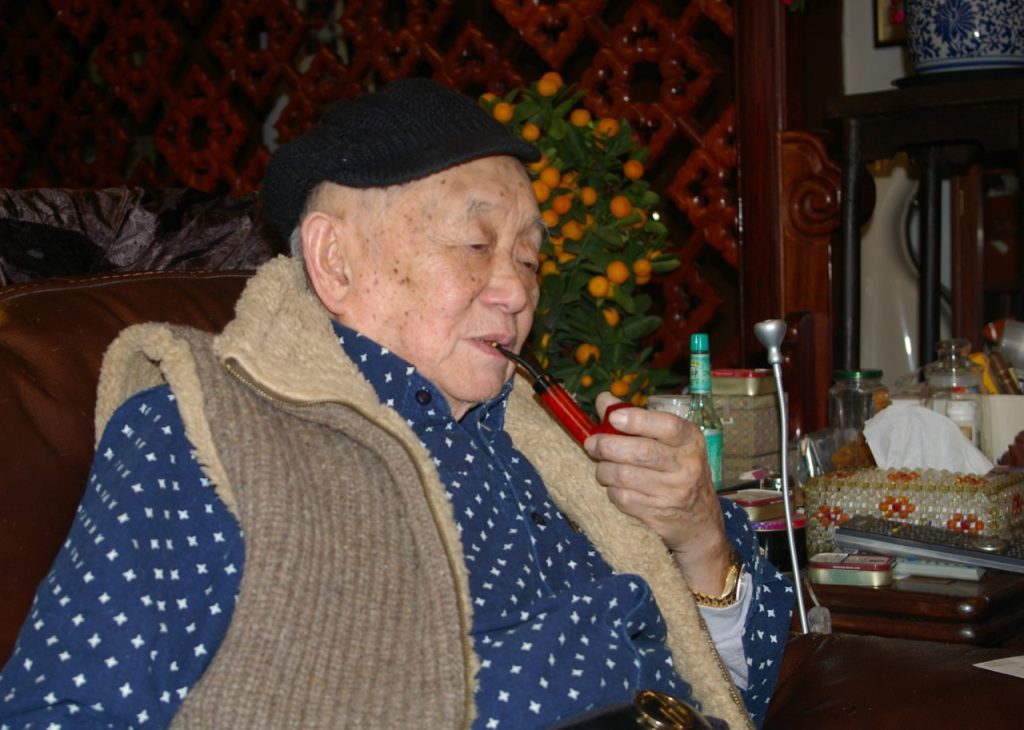
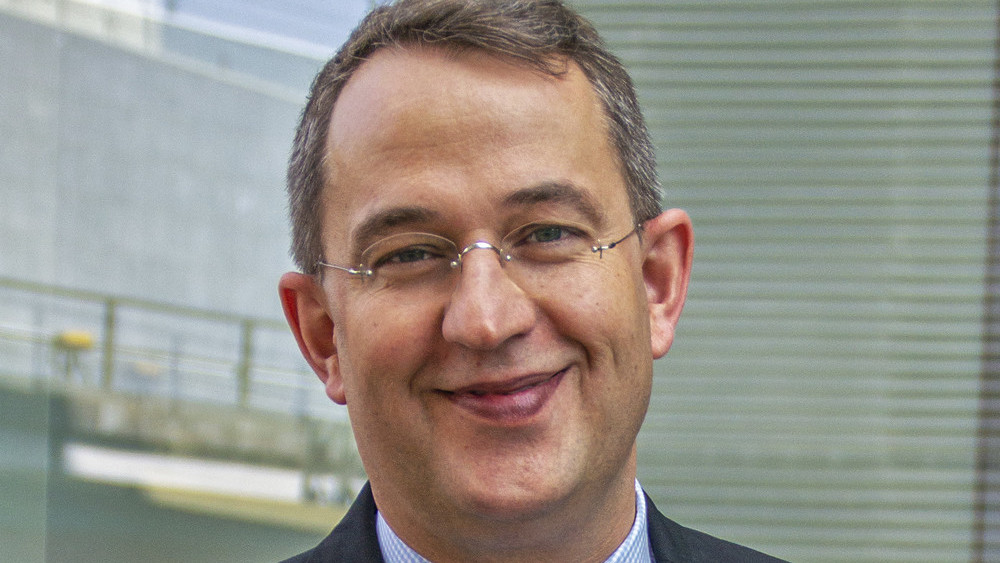
The request reached me last summer: I had published a photo showing me with Dr. Wang Huiyao, the founder and president of the Center for China and Globalization (CCG). Was I not aware that I had allowed myself to be photographed with a representative of the Chinese “United Front”?
What had happened? On the occasion of a European trip by Dr. Wang, amid the COVID-19 pandemic, I had one of the few opportunities to meet a representative of a respected Chinese think tank in person – hosting a working breakfast in Berlin on the future of German-Chinese relations.
Kindly, I pointed out to the questioner, a young journalist from a major German newspaper, that Dr. Wang was a respected scholar and knowledgeable expert on Chinese foreign policy. I mentioned that the CCG cooperates with the Munich Security Conference and hosted a dinner there in February 2020, where even (the US Special Presidential Envoy for Climate, editor’s note) John Kerry was photographed with Dr. Wang. Unfortunately, it made no difference; the young man’s judgment was already fixed. I had become part of a Chinese “influence operation”.
This attribution was not new to me. In 2019, together with the former Vice President of the German Bundestag, Dr. Hans-Peter Friedrich, I founded the “China-Bruecke” in Berlin. The idea that there could be a circle of personalities from business, science, culture and politics who, out of their own conviction – without any incentive from Chinese authorities – could advocate for more channels of dialogue and a more constructive approach to China already exceeded the imagination of many media representatives. It was entirely irrelevant that the China Bridge did not accept Chinese citizens or Chinese contributions: of course, it too was a Chinese “influence operation”.
Recently, I had the pleasure once again. In 2016, I was the patron of the founding of a Sino-German alliance of industrial cities, which aimed to establish a platform for professional exchange between municipal economic developers from Germany and China for investments in each other’s countries, on the initiative and with the support of the southern Chinese city of Foshan. Not entirely unsuccessful: More than 40 cities were won over for the project. The German Trade and Invest Agency (GTAI) and the Chinese Ministry of Commerce’s China Investment Promotion Agency (CIPA) served as advisory board members. But thanks to the renewed efforts of courageous journalists to protect Germany from “attempted infiltration”, I now know that this too was nothing more than an “influence operation”.
“Influence operations” everywhere. Since the publication of Clive Hamilton and Mareike Ohlberg’s book “Hidden Hand: Exposing How The Chinese Communist Party Is Reshaping The World” 2020, the claim that China, guided by an invisible hand, is “undermining Western democracies” with various initiatives has become a guiding principle in much of the China reporting in our country.
Advocates for German-Chinese cooperation are defamed, and their reputation is damaged, as if it were about proving that our tabloid media can still compete with those that Heinrich Boell made the subject of his 1974 narrative, “The Lost Honor of Katharina Blum”. And all of this is fueled by a journalistic ethos that believes it can compensate for lack of knowledge and expertise with the right “attitude”.
In the 2000s, I was a member of the state board of the German Journalists’ Association in Berlin for some time. At that time, it was the sponsor of the Berlin Journalist School and had many discussions about quality assurance in reporting. Reflection on one’s own journalistic actions and their consequences had a high priority in these discussions. Today, in a time of increasing ideology and polarization in our debates, where all kinds of conspiracy theories flourish, not much seems to be left of that.
The mantra of ubiquitous “infiltration” by China bears more than a resemblance to the “Deep State” murmurs of the “free thinkers”. However, its advocates are bidding farewell to a new, self-inflicted immaturity.
State and Party leader Xi Jinping has made new appointments to the ambassadorships of three countries:
Zhao Bin becomes ambassador to the Democratic Republic of Congo, replacing Zhu Jing.
Zhou Ding is appointed as the new ambassadorto Zimbabwe, replacing Guo Shaochun.
Tang Songgen will become the ambassador to Latvia and will replace Liang Jianquan.
Is something changing in your organization? Let us know at heads@table.media!

In the past, scaffolding was often made of bamboo. Nowadays, even in China, it is made of steel. Despite the ongoing real estate crisis, many cities are filled with these scaffolds. The construction boom in China continues. However, buyers don’t necessarily find the finished properties. Vacancy rates are reaching new records. That’s how the “Socialist market economy with Chinese characteristics” works.
The long-awaited National Security Strategy of the German Government is here. On Wednesday, the traffic light coalition ministers presented it – in German, English and French. Japanese and Polish versions are said to follow soon. And what about a version in Chinese? There will be one. One day.
Overall, the direct references to China are extremely limited – even though the People’s Republic has long been seen by German authorities as a significant security risk. But a separate China strategy is said to be coming “soon”, as emphasized by Chancellor Olaf Scholz during the presentation. Or is the federal government just trying not to spoil the mood? After all, German-Chinese government consultations will take place in Berlin next week. And they wouldn’t want to upset the most important trading partner shortly before that.
Today, Xi Jinping celebrates his 70th birthday. From a traditional Chinese perspective, this is not a reason to celebrate. In Chinese, the word for 70 includes the word for decade (shi). And with a southern Chinese accent, it sounds similar to the word for death (si). Therefore, in old age, it is preferable to celebrate the year that includes the number 9 because 9 (jiu) sounds the same as “eternal” in Chinese.
Michael Radunski analyzes why even with regard to Xi, this is not a reason to celebrate. Because eternal refers to Xi’s party leadership and presidency. And these are not good prospects for China and the rest of the world.


Unsurprisingly, the new strategy identifies “today’s Russia” as the “greatest threat to peace and security in the Euro-Atlantic area for the foreseeable future. In the long term, however, the relationship with China appears to be more significant, especially in view of the commitment to a multipolar world.
At the joint press conference, Finance Minister Christian Lindner (FDP) tried to sum up the attitude toward the People’s Republic: “The US is a value partner, China is a trade partner, but a value rival.” The paper has 74 pages. On China, however, the strategy remains vague and contradictory, as is currently customary. It emphasizes dangers, weighted equally with indispensable partnership.
To this end, the government retreats to the formula of China as a “partner, competitor and systemic rival,” which is currently perceived as politically safe. “We see that the elements of rivalry and competition have increased in recent years, but at the same time China remains a partner without whom many of the most pressing global challenges cannot be resolved,” the overview says.
Further on, on page 23, this approach is elaborated. The national strategy on China formulates the following warnings:
So far, so right. Anyone hoping for an answer to the question of how to respond to the tricky challenge of China will be disappointed by the paper. The German government may be saving this for its China strategy, which could be published at the beginning of July, according to reports.
The argument that a more specific China strategy should be derived from the more general overall strategy only works to a limited extent in this document. The dilemma of a dominant trading partner that is becoming increasingly alienated from Germany in terms of its willingness to engage in dialogue and its practiced values is discussed here, above all with regard to Russia.
The tough decisions on China have thus been postponed again. Chancellor Olaf Scholz expressly emphasized that he was aiming for a “balance”. German-Chinese government consultations will be held in Berlin next week.
Numerous paragraphs of the paper, however, refer to issues where China is the biggest headache for German policymakers. “In general, we must end or at least reduce unilateral dependencies in critical areas, especially through diversification,” it says. Commodity projects are to be targeted together with the business community. For example, there should be government incentives for companies to build up reserves of critical raw materials to compensate for supply disruptions.
In general, international economic and financial relations are to be checked for unilateral dependencies because this has a security policy dimension. But these generalized passages do not answer the question of how the economy should diversify away from the largest market, largest production location and largest supplier without replacement.
The subject of large parts of the paper is the material equipment of the security organs and their European coordination. The approach of “integrated security,” which underlies the National Security Strategy, is intended to go beyond the previous focus on armed forces and diplomacy but also to look at internal security, cyber threats, the effects of economic policy and climate change.
“Bringing all strands of policy” together, however, must succeed without additional funding for the time being, in the view of the traffic light coalition: “In view of the considerable current demands on our public budgets, we are striving to manage the tasks of this strategy without placing an additional burden on the federal budget as a whole.” Lindner rejects the target of two percent of economic output for the defense budget as “not feasible”.
The guidelines of the new strategy under the slogans “Robust. Resilient. Sustainable.” essentially summarize the government’s previous efforts but hardly provide for any fundamentally new approaches. There is no provision for a national security council, as was repeatedly called for in the debate on this strategy, including by the coalition.
Both Foreign Minister Annalena Baerbock (The Greens) and Scholz stressed that the German government’s work in response to Russia’s war of aggression against Ukraine showed that the government apparatus was capable of acting and that no new body needed to be established. Finn Mayer-Kuckuk/Thomas Wiegold

There is currently a debate in China about raising the retirement age. Jin Weigang, president of the Chinese Academy of Labor and Social Security Sciences, recently announced: “People approaching retirement age will have to delay retirement by a few months.” Currently, men in China retire at age 60 and women at age 55. China’s President Xi Jinping (习近平) turns 70 this Thursday. So it would be high time for him to retire.
But as if Jin Weigang had the same thought, he added in an interview with the Global Times newspaper: “The most important feature of the reform is that people can decide for themselves when they want to retire, depending on their circumstances and conditions.” Xi Jinping’s decision is clear. To that end, he has even had the 1982 Chinese constitution’s term limit, and thus the age limit for the office of president, lifted.
Xi Jinping began his third term as president of China this year. And it doesn’t have to stop there. Theoretically, he can rule for life. A circumstance that politicians and legal experts actually wanted to prevent in the 1982 constitution.
With Mao’s reign in mind, they feared that a lifetime in office would again lead to arbitrariness and tyranny, especially in a one-party state. “If someone stays in office for 15 years, the people won’t dare express their opinions to him,” said Fang Yi, one of the drafters of that constitution.
And not only the people. In the current Politburo, at the latest, Xi is surrounded only by loyal cadres. Since then, even in the closest leadership circle, Xi has only been told what he wants to say, critics fear.

As evidence of how far Xi was disconnected from reality, some cite China’s strict zero-Covid policy. With all his might, Xi had rejected foreign mRNA vaccines, preferring to send millions of people into months-long lockdowns. Only when discontent broke out on the streets of several metropolises did Xi relent and have all restrictions lifted.
The problem is obvious: The more power a person has, the more error-prone the system becomes. And the more difficult it is to correct mistakes. Xi is still succeeding. But the next question immediately arises.
Only he himself knows for sure. A glance at his great rival in Washington makes him seem almost youthful: US President Joe Biden is 80 years old, while his predecessor and possible challenger Donald Trump is 76. Nevertheless, it is unlikely that Xi will make his retirement dependent on the age of his counterparts.
Rather, it would be up to Xi himself to build a successor. Deng Xiaoping once installed Jiang Zemin. He, in turn, handed over the leadership to Wen Jiabao and Hu Jintao in an orderly fashion. Even when bitter trench warfare arose again in the CP, it was possible to agree on a candidate in due time after two terms in office: Xi Jinping was considered at the time to be a compromise who would not hurt anyone. Things turned out differently. And Xi himself has not yet chosen a successor. Last October, he was confirmed as general secretary of the Communist Party for another five years at the party congress. Why is Xi doing this?
One theory is that Xi simply doesn’t trust anyone else to do the job. His mission manifests itself in the ideas of the “Chinese Dream” (中国梦) and the “rejuvenation of the Chinese nation” (中华民族伟大复兴). Xi sees both of these in jeopardy. China is currently facing huge problems: weak economic growth, real estate bubble, indebted provinces. In addition, youth unemployment is at record levels. China’s society is also shrinking and getting older.

In terms of foreign policy, the situation is hardly any better: The competition with the US is getting tougher and tougher, in Europe China’s annoyance is spreading, and neighboring countries are increasingly concerned about China’s strength. And the list could be continued with topics such as power shortages, Xinjiang, Hong Kong, Taiwan, Ukraine, Russia and the Belt and Road Initiative.
In such a situation, it would be irresponsible from Xi’s point of view to send the CP into a delicate transition process. So he has to do it himself, as China’s COE – Chairman Of Everything. Xi not only heads the party, the state and the military but also leads countless other leadership groups: on reform policy, the economy and finance, Hong Kong and Macao, national security, the modernization of the military or cyber security. In short, Xi is “chairman of everything”.
Another theory is that Xi cannot resign because, otherwise, he would have to fear for his own fate. After all, to become so powerful in the first place, Xi had to eliminate countless rivals along the way. Former Vice Minister of Public Security Sun Lijun, ex-security czar Zhou Yongkang and Bo Xilai are only the most famous names on a long list.

Especially under the pretext of “fighting corruption” many were literally put through the wringer. The “tigers” as well as the “flies”, the large as well as the rather small cadres. In just four years, more than 1.3 million officials and civil servants fell into the clutches of the all-powerful Central Disciplinary Commission. Many of them, their families and their networks are now waiting for their chance to take revenge.
Xi had to experience in his own family how quickly fate can turn: His father, Xi Zhongxun (习仲勋), was a revolutionary of the first hour and deputy prime minister of China – until Mao suddenly dropped his close confidant in 1962.
One way out for Xi would be to build a strong successor. But even if Xi were to find someone he trusted to lead China, it would be an extremely difficult balancing act: Xi‘s successor would have to be strong enough to protect Xi from his opponents even in retirement. On the other hand, he should not be too strong either because few retired leaders have managed to accustom their egos to a life in the second row.
Even the often-praised Deng Xiaoping, who had the orderly two-term transition introduced, continued to pull the strings in the background as the “outstanding leader” until his death. Time and again, he interfered in current politics-whenever he thought his political legacy was in danger. In the case of Xi Jinping, that would probably be: always.
After US Secretary of State Antony Blinken canceled his trip to Beijing in early February due to accusations of espionage against China, he plans to make up for it at the end of this week. Blinken is expected to be in Beijing on June 18 to meet with high-ranking representatives of the Chinese government, according to the US State Department. The aim, it said, is to maintain open channels of communication between the two countries in order to manage relations responsibly.
Following the launch of an alleged Chinese spy balloon over US territory and the ensuing diplomatic rifts in early February, Blinken did meet with China’s top foreign policy official, Wang Yi, on the sidelines of the Munich Security Conference. However, the meeting caused further tensions. Blinken always stressed that he wanted to travel to China as soon as the circumstances were right. However, the leadership in Beijing reacted dismissively to offers of talks from Washington.
In May, after a prolonged radio silence, another meeting of high-level representatives of the two governments took place: Biden’s National Security Advisor, Jake Sullivan, met Wang Yi in Vienna. Afterwards, the US side said that it was ready to put the recent espionage affair behind it. Finally, in early June, a senior official from the US State Department traveled to China. This was interpreted as preparation for an imminent visit by Blinken.
Shortly before Blinken’s trip announcement, however, new allegations of spying attempts by China against the US emerged. Blinken said a few days ago that China has been using the island of Cuba, which is close to the US, to gather intelligence for some time. flee
During Palestinian President Mahmoud Abbas’ visit to Beijing, China took a clear position on the Middle East issue. “The fundamental solution to the Palestinian issue lies in the establishment of an independent Palestinian state based on the 1967 borders with East Jerusalem as its capital,” Xi said, according to Chinese state media.
Back in December, Xi had promised Abbas at a meeting in Saudi Arabia that he would act as a mediator in the Middle East issue. According to Chinese media reports, Xi announced support for admitting the Palestinian Authority as a full member of the United Nations. The United States opposes full Palestinian membership in the UN unless a peace agreement is reached with Israel.
Xi and Abbas announced a strategic partnership during the Beijing visit and signed a number of bilateral cooperation documents, including a pact on economic and technological cooperation, an agreement on reciprocal visa waiver for diplomatic passports, and a friendship between the Chinese city of Wuhan and Ramallah, the seat of the Palestinian government in the West Bank. jul/rtr
Taiwan’s Foreign Minister Joseph Wu has asked for European support in Prague to ensure peace and stability in the Taiwan Strait. “In order for Taiwan to stay strong and resilient and to have the courage to continue the policy of maintaining the status quo, we do need support from European friends,” Wu said in a speech at a conference in the Czech capital.
Czech President Petr Pavel was also present at the event. Pavel was thus the first EU head of state to be officially in the same room with a representative of Taiwan at an event. The Czech Republic does not maintain diplomatic relations with Taiwan. In his speech, Pavel stressed the need to protect democratic governance in Taiwan in the face of increasing pressure from China. However, a face-to-face meeting between Pavel and Wu did not take place.
Foreign Minister Wu was in Prague to meet Milos Vystrcil, president of the Czech Senate. Vystrcil had tried to promote the EU state’s relations with Taiwan in recent years. Wu will also travel to Brussels to meet EU officials. The Czech Republic has changed its approach toward China and Taiwan since the center-right government took office in 2021. Pavel, who took office in March, was the first EU head of state to make phone calls to Taiwan’s President Tsai Ing-wen after his election – rather than to Beijing first. Pavel nevertheless rueled out a trip to Taipei for the time being.
Wang Lutong, China’s director general for European affairs, had criticized Wu’s trip in advance. The Taiwan issue is “core of the core interests of China,” Wang wrote on Twitter. “We urge the European side not to provide stages for separatist activities for ‘Taiwan independence’.” ari
Five China- and Hong Kong-based companies have been removed from the list of potential targets in negotiations on the planned EU sanctions package, according to a media report. Three companies were to remain listed, South China Morning Post reported Wednesday, citing EU circles. Talks with Chinese diplomats had taken place beforehand, it said. The draft sanctions list is part of a broader Russia sanctions package. The companies are to face punitive measures for forwarding banned European goods to the Russian military.
Names circulating in connection with the possible sanctions since early May include 3HC Semiconductors, King-Pai Technology and Sinno Electronics. The narrowing of the list was not yet finally set in stone, according to the report. Negotiations on the eleventh sanctions package are in full swing. Hungary is said to have recently eased its blockade against concessions on the originally planned listing of Chinese companies. EU ambassadors were closer to an agreement on Wednesday. The positions were in “98 percent” agreement, a diplomat said.
With regard to the mechanism for sanctions against third countries that serve as a hub for circumvention deals towards Russia, the EU Commission has largely been able to dispel concerns. Diplomats said the Commission had specified which goods and technologies could be specifically targeted. EU ambassadors plan to make a new attempt to reach an agreement on Monday. After that, the 11th sanctions package would have to be formally signed off by governments in a written procedure. sti/ari
Janka Oertel, Asia expert at the think tank ECFR, wants to run for the European Parliament for the Green Party, as the scientist announced yesterday on Twitter.
Oertel is a distinguished sinologist and China expert with extensive international experience. She was a senior fellow in the Asia program of the German Marshall Fund of the United States (GMF) in Berlin, where she worked on transatlantic China policy as well as emerging technologies and security in East Asia. Oertel completed her doctorate at the University of Jena on Chinese policy within the United Nations, including work at UN headquarters in New York.
She has support from the party leadership: Green Party leader Omid Nouripour also welcomed the announcement for the European elections on Twitter: “It’s good news that Janka wants to go to Europe for us. She would be an enrichment for the Green Group in the European Parliament. Especially in these times, we need a proven China expert as a strong European voice.” mgr/flee
Despite extremely strict US supply chain regulations on products from Xinjiang, Chinese online shopping retailer Temu is selling fashion products from Xinjiang to American consumers. This is reported by Bloomberg with reference to research findings by Tel Aviv-based Ultra Information Solutions, which reviews global supply chains.
Since 2021, the Uyghur Forced Labor Prevention Act (UFLPA) has prohibited cotton import from Xinjiang. Last year, the law was extended to all products from Xinjiang. Among the ten Temu products from Xinjiang discovered by Ultra Information Solutions are sunglasses and sandals. Their origin was not indicated on the sales page. It cannot be proven that any of the products were made under forced labor. “However, their proximity means there is a likely risk, not just a theoretical risk,” says Ben Tzion, CEO of Ultra Information Solutions.
Shipments from China that are sold directly to consumers can avoid the import ban from the UFLPA because they are under an 800 dollars value threshold, above which only a reporting requirement to US Customs and Border Protection is triggered.
Temu belongs to PDD Holdings Inc., which also operates China’s e-commerce portal Pinduoduo. As a shopping portal for clothing and decorative items at extremely low prices, it is a competitor of Shein and aims to wrest market share from Amazon and eBay in the USA. During investigations last year, Bloomberg also discovered garments at Shein whose cotton originates from Xinjiang. jul
China is expected to experience the largest exodus of millionaires worldwide this year, according to a study by Henley & Partners. The study predicts that approximately 13,500 individuals with a net worth of over $1 million will leave the People’s Republic of China. India ranks second among countries from which the wealthy are emigrating, with 6,500 individuals, followed by the United Kingdom with 3,200.
One of the main reasons cited is Xi Jinping’s concept of “Common Prosperity”. As a political guideline, it has made the business climate difficult for many entrepreneurs in recent years, partly due to harsh crackdowns in various industries. Wealthy entrepreneurs are increasingly drawn to foreign countries, such as Singapore, which is culturally and geographically close. Additionally, Covid restrictions have contributed to many wealthy Chinese individuals immigrating to the city-state. jul
Renowned artist and designer Huang Yongyu has died. His family announced that he passed away on Wednesday afternoon. He was 99 years old. Huang is best known in China for designing stamps featuring the twelve Chinese zodiac animals. In January, he created stamps for the Year of the Rabbit (2023).


The request reached me last summer: I had published a photo showing me with Dr. Wang Huiyao, the founder and president of the Center for China and Globalization (CCG). Was I not aware that I had allowed myself to be photographed with a representative of the Chinese “United Front”?
What had happened? On the occasion of a European trip by Dr. Wang, amid the COVID-19 pandemic, I had one of the few opportunities to meet a representative of a respected Chinese think tank in person – hosting a working breakfast in Berlin on the future of German-Chinese relations.
Kindly, I pointed out to the questioner, a young journalist from a major German newspaper, that Dr. Wang was a respected scholar and knowledgeable expert on Chinese foreign policy. I mentioned that the CCG cooperates with the Munich Security Conference and hosted a dinner there in February 2020, where even (the US Special Presidential Envoy for Climate, editor’s note) John Kerry was photographed with Dr. Wang. Unfortunately, it made no difference; the young man’s judgment was already fixed. I had become part of a Chinese “influence operation”.
This attribution was not new to me. In 2019, together with the former Vice President of the German Bundestag, Dr. Hans-Peter Friedrich, I founded the “China-Bruecke” in Berlin. The idea that there could be a circle of personalities from business, science, culture and politics who, out of their own conviction – without any incentive from Chinese authorities – could advocate for more channels of dialogue and a more constructive approach to China already exceeded the imagination of many media representatives. It was entirely irrelevant that the China Bridge did not accept Chinese citizens or Chinese contributions: of course, it too was a Chinese “influence operation”.
Recently, I had the pleasure once again. In 2016, I was the patron of the founding of a Sino-German alliance of industrial cities, which aimed to establish a platform for professional exchange between municipal economic developers from Germany and China for investments in each other’s countries, on the initiative and with the support of the southern Chinese city of Foshan. Not entirely unsuccessful: More than 40 cities were won over for the project. The German Trade and Invest Agency (GTAI) and the Chinese Ministry of Commerce’s China Investment Promotion Agency (CIPA) served as advisory board members. But thanks to the renewed efforts of courageous journalists to protect Germany from “attempted infiltration”, I now know that this too was nothing more than an “influence operation”.
“Influence operations” everywhere. Since the publication of Clive Hamilton and Mareike Ohlberg’s book “Hidden Hand: Exposing How The Chinese Communist Party Is Reshaping The World” 2020, the claim that China, guided by an invisible hand, is “undermining Western democracies” with various initiatives has become a guiding principle in much of the China reporting in our country.
Advocates for German-Chinese cooperation are defamed, and their reputation is damaged, as if it were about proving that our tabloid media can still compete with those that Heinrich Boell made the subject of his 1974 narrative, “The Lost Honor of Katharina Blum”. And all of this is fueled by a journalistic ethos that believes it can compensate for lack of knowledge and expertise with the right “attitude”.
In the 2000s, I was a member of the state board of the German Journalists’ Association in Berlin for some time. At that time, it was the sponsor of the Berlin Journalist School and had many discussions about quality assurance in reporting. Reflection on one’s own journalistic actions and their consequences had a high priority in these discussions. Today, in a time of increasing ideology and polarization in our debates, where all kinds of conspiracy theories flourish, not much seems to be left of that.
The mantra of ubiquitous “infiltration” by China bears more than a resemblance to the “Deep State” murmurs of the “free thinkers”. However, its advocates are bidding farewell to a new, self-inflicted immaturity.
State and Party leader Xi Jinping has made new appointments to the ambassadorships of three countries:
Zhao Bin becomes ambassador to the Democratic Republic of Congo, replacing Zhu Jing.
Zhou Ding is appointed as the new ambassadorto Zimbabwe, replacing Guo Shaochun.
Tang Songgen will become the ambassador to Latvia and will replace Liang Jianquan.
Is something changing in your organization? Let us know at heads@table.media!

In the past, scaffolding was often made of bamboo. Nowadays, even in China, it is made of steel. Despite the ongoing real estate crisis, many cities are filled with these scaffolds. The construction boom in China continues. However, buyers don’t necessarily find the finished properties. Vacancy rates are reaching new records. That’s how the “Socialist market economy with Chinese characteristics” works.
